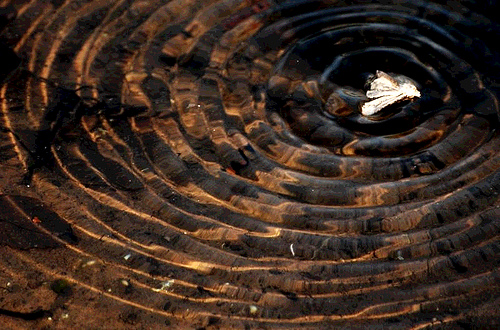We run our website the way we wished the whole internet worked: we provide high quality original content with no ads. We are funded solely by your direct support. Please consider supporting this project.
Why We Can’t Know Why Bad Things Happen
Science has demonstrated that the slightest variation in a sufficiently complex process at one point may cause remarkable variations in that process at another point. It’s called chaos theory. The flap of a butterfly wing in one part of the globe can be, under the right conditions, the deciding variable that brings about a hurricane in another part of the globe several months later. (This has been called “the butterfly effect.”) To exhaustively explain why a hurricane (or any weather pattern, for that matter) occurs when and where it does, we’d have to know every detail about the past history of the earth—including every flap of every butterfly wing. Of course, we can’t ever approximate this kind of knowledge, which is why weather forecasting will always involve a significant degree of guesswork.
By analogy, this insight may be applied to free decisions. Because love requires choice, humans and angels have the power to affect others for better or worse. Indeed, every decision we make affects other agents in some measure. Sometimes the short-term effects of our choices are apparent, as in the way the decisions of parents immediately affect their children or the way decisions of leaders immediately affect their subjects. The long-term effects of our decisions are not always obvious, however. They are like ripples created by a rock thrown into a pond. Ripples endure long after the initial splash, and they interact with other ripples (the consequences of other decisions) in ways we could never have anticipated. And in certain circumstances, they may have a “butterfly effect.” They may be the decisive variable that produces significant changes in the pond.
Each person influences history by using his or her morally responsible say-so, creating ripples that affect other agents. And as the originators and ultimate explanations for their own decisions, individuals bear primary responsibility for the ripples they create. Yet each individual is also influenced by the whole. Decisions others have made affect their lives, and these people were themselves influenced by decisions others made. In this sense every event is an interference pattern of converging ripples extending back to Adam, and each decision we make influences the overall interference pattern that affects subsequent individuals.
From this it should be clear that to explain in any exhaustive sense why a particular event took place just the way it did, we would have to know the entire history of the universe. Had any agent, angelic or human, made a different decision, the world would be a slightly different—or perhaps significantly different—place. But we, of course, can never know more than an infinitesimally small fraction of these previous decisions, let alone why these agents chose the way they did. Add to this our massive ignorance of most natural events in history—which also create their own ripples—combined with our ignorance of foundational physical and spiritual laws of the cosmos, and we begin to see why we experience life as mostly ambiguous and highly arbitrary. We are the heirs to an incomprehensibly vast array of human, angelic, and natural ripples throughout history about which we know next to nothing but which nevertheless significantly affect our lives.
When all is said and done, the mystery of why any particular misfortune befalls one person rather than another is not different than the mystery of why any particular event happens the way it does. Every particular thing we think we understand in creation is engulfed in an infinite sea of mystery we can’t understand. The mystery of the particularity of evil is simply one manifestation of the mystery of every particular thing.
—Adapted from Is God to Blame? pages 97-99
Category: General
Tags: Chaos Theory, Is God to Blame?, Problem of Evil, Suffering, The Butterfly Effect, Variables
Topics: The Problem of Evil
Related Reading

How Much Does the Cross Really Matter?
The cross is as foolishness and weakness to nonbelievers, but Paul wrote that to those who are being saved it is both “the power” and “wisdom of God” (1 Cor 1:18, 24). In sharp contrast to the controlling power and wisdom that has been ascribed to God or the gods throughout history—including in much of…

Satan and the Corruption of Nature: Seven Arguments
Man…trusted God was love indeed And love Creation’s final law – Tho’ Nature, red in tooth and claw With ravine, shrek’d against his creed” —Tennyson, In Memoriam Tennyson nailed it. We trust that God is love, but we also believe that God is the Creator of nature, and nature simply does not seem to point…

Enduring an Evil-Infested World (6 Principles) —part one
We live in the midst of a spiritual battlefield where we face evil daily. Yet we are also in the midst of an ambiguity that hinders us from knowing why any given evil occurs as it does. Can we find solace, hope, and courage in the midst of this war, especially when we face meaningless…

Approaching Chronic Illness with Wisdom
CNN posted this article on what to say and what not to say when someone you love is suffering with chronic illness. Sometimes our best intentions cause more harm than good, and we need to approach people in pain with a great deal of wisdom and sensitivity. From the article: When people we care about…

Podcast: Isn’t God the Author of Suffering in the Crucifixion?
Greg considers the implications of his Cruciform Hermeneutic on his previous work in God at War. http://traffic.libsyn.com/askgregboyd/Episode_0274.mp3

The Gift of Bearing Witness
Eustaquio Santimano via Compfight Our friend, Jonathan Martin, was featured in She Loves Magazine in a piece he wrote called At Least One Person Waiting. It’s an extraordinary reflection on sitting with the ones we love when they are suffering and we are powerless. From Jonathan’s reflection: We all have different skills, different things to…

